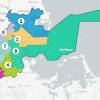Updated May 10 at 4:02 p.m.
Boston Mayor Michelle Wu said Wednesday that she will propose new City Council district boundaries in the next few days in an effort to replace the district map that was thrown out by a federal judge this week.
Wu also asked the Council to pass a home rule petition delaying filing requirements for council candidates. The city’s deadline for candidates filing to run is less than two weeks away, but without an approved map, candidates will not know where their district boundaries are.
Wu said the new map has to be in place by May 30 in order for the Elections Department to have time for the signature and petition process to go forward and to print and mail ballots in time for the September preliminary election.
"In the coming days, my office will be submitting to your Honorable Body a new proposed redistricting map for consideration that provides a robust opportunity for all voters to see themselves represented and reflected on the City Council and prioritizes placing whole neighborhoods together within individual districts," Wu wrote in a letter to the Council.
A federal judge Monday struck down the boundaries of Boston’s latest voting map, siding with critics who argued that race was improperly considered above other factors during the map-making process.
The now-barred map, approved by a majority of councilors last fall, made the bulk of its changes to boundaries that define who votes in Dorchester and South Boston, two sections of the city long considered strongholds of white political power.
In one particularly contentious move, the council removed a section of white, high-turnout voters from one Dorchester voting district into another, majority Black one.
In a heated hearing Wednesday, a divided council voted 8-4 to send the issue to the Council's Committee on Civil Rights and Immigrant Advancement, chaired by At-Large Councilor Ruthzee Louijeune, rather than having the entire Council redraft the map.
Councilor Frank Baker, who represents District 3 where white voters would have been removed under the now-defunct plan, objected to this move. Baker is not a member of the Civil Rights Committee and said that he and his constituents had already been cut out of the process of drafting the previous version of the district map.
"Not one person asked me my opinion on District 3," Baker said. "Not one person came to District 3 to see what you were cutting up. You cut us up. And I had no say."
District 5 Councilor Ricardo Arroyo, who led the redistricting process through most of last year, rejected Baker's claim.
"People keep saying, 'I didn't have a voice! I didn't have a voice!' But they were the loudest people in these processes. They were in every single hearing. They did have a voice," he said. "Simply the [Council] as a majority did not go in that direction."
At-Large Councilor Erin Murphy, who voted against last year's map, also opposed giving it to the Civil Rights Committee and suggested that the City Council should make sure it retains control over the process rather than the mayor.
"We can get this done, and I think we as a Council want to make sure that we have a say — and that a map isn't just drawn from across the hall that we accept," she said.
This article includes previous GBH News reporting from Saraya Wintersmith.








